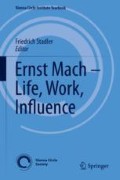Abstract
In his general philosophical remarks, scattered across different oeuvres, Mach subscribed to a number of doctrines. First, the thesis of the economy of science: The primary, perhaps the only legitimate goal of scientific theories is to achieve the economy of thought. Instead of recording many facts, science codifies them under the heading of laws. Instead of attending to individual diverse sensations, science postulates the existence of bodies. Then we have evolutionism: Human activities must ultimately be understood in terms of Darwin’s theory. A man is a biological product of evolutionary development. But only human activities: history of knowledge, ideas, thoughts is only intelligible by the lights of evolutionary theory. Finally, phenomenalism: Sensations are denizens of the world, whereas bodies (material substances) are symbols constructed in thought, chiefly to serve the purposes of economy. Are these views jointly consistent? I argue that the role of naturalism, prominent in the endorsement of the evolutionary theory, creates an unresolved tension among those views. Phenomenalism in particular is deeply revisionary. It appears to be a remnant of empiricist metaphysics casting doubt on pretty much every area of scientific discourse. The adoption of full-fledged philosophical naturalism should be able to resolve the tension without ruling out the possibility of a methodological critique of scientific theories.
Access this chapter
Tax calculation will be finalised at checkout
Purchases are for personal use only
Notes
- 1.
Cited from Mach (1919).
- 2.
Cited from Mach (1898).
- 3.
Cited from Mach (1959).
- 4.
Cited from Mach (1986).
- 5.
Cited from Mach (1898).
- 6.
Recent scholarship has largely challenged the attribution of phenomenalism: see, e.g., Banks (2014). I recognise the force of its arguments, but remain unconvinced. The least one can say, it seems to me, is that there are many passages in Mach that one would expect to find in Berkeley. It is true that Mach explicitly denied the affinity with Berkeley in Mach (1891), but the denial is as passionate as it is cryptic. At all events, the present discussion proceeds on the assumption that phenomenalism, broadly conceived, can be ascribed to Mach. The assumption, I think, even if stands in conflict with some of Mach’s claims about sensations and complexes, is not altogether fanciful.
- 7.
See Science of Mechanics II.v–vi.
- 8.
- 9.
See, e.g., Wärmelehre XXX.
- 10.
See, e.g., Analysis of Sensations XIV.14.
- 11.
Cited from Mach (1911). The same claim is in Science of Mechanics IV.iv.9.
References
Banks, E. C. (2003). Ernst Mach’s World Elements. Springer.
Banks, E. C. (2014). The Realistic Empiricism of Mach, James, and Russell. Cambridge University Press.
Mach, E. (1891). Some questions of psycho-physics. The Monist, 1(3):393–400.
Mach, E. (1898). Popular Scientific Lectures. Open Court.
Mach, E. (1911). History and Root of the Principle of the Conservation of Energy. Open Court.
Mach, E. (1919). Science of Mechanics. Open Court.
Mach, E. (1959). The Analysis of Sensations. Dover.
Mach, E. (1986). Principles of the Theory of Heat. D. Reidel.
Author information
Authors and Affiliations
Editor information
Editors and Affiliations
Rights and permissions
Copyright information
© 2019 Springer Nature Switzerland AG
About this chapter
Cite this chapter
Berkovski, S. (2019). Some Remarks on Mach’s Philosophical Doctrines. In: Stadler, F. (eds) Ernst Mach – Life, Work, Influence. Vienna Circle Institute Yearbook, vol 22. Springer, Cham. https://doi.org/10.1007/978-3-030-04378-0_8
Download citation
DOI: https://doi.org/10.1007/978-3-030-04378-0_8
Published:
Publisher Name: Springer, Cham
Print ISBN: 978-3-030-04377-3
Online ISBN: 978-3-030-04378-0
eBook Packages: Religion and PhilosophyPhilosophy and Religion (R0)

